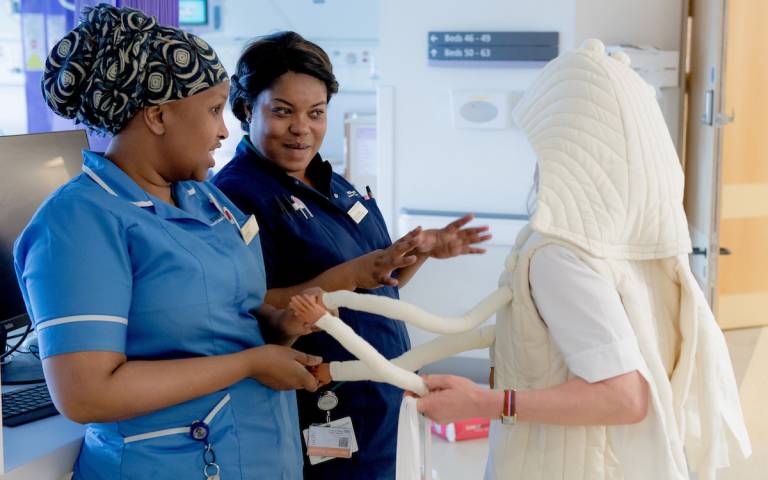Inaugural Lecture: Professor Kerstin Sailer
07 March 2024, 7:00 pm–8:30 pm

Kerstin Sailer delivers her inaugural professorial lecture with an introduction by Christoph Lindner, Dean of The Bartlett Faculty.
This event is free.
Event Information
Open to
- All
Availability
- Yes
Cost
- Free
Organiser
-
The Bartlett School of Architecture
About
Kerstin Sailer delivers her inaugural professorial lecture, hosted and introduced by Christoph Lindner, Dean of The Bartlett Faculty. This lecture will take place in the Christopher Ingold Auditorium, 22 Gordon Street, at 19:00 GMT followed by a reception in The Bartlett School of Architecture Exhibition Space.
Guests are encouraged to wear masks for this lecture, you may bring your own or they will be provided on entry. Thank you for your understanding.
Abstract
Architectures of Care: From Data-Driven Design to User Empathy
In her inaugural lecture, Kerstin will turn the spotlight of architecture away from aesthetics or critiques of form towards an emphasis on the lived experiences of people as afforded by certain spatial structures. Space in this sense is seen as a mechanism of bringing people together or keeping them apart. Arguing for architectures of care means understanding everyday life and the diverse processes of space usage and user behaviour inside buildings better than we normally do in order to design differently: more user-focused, more problem-oriented, more thoughtful, more diverse, more inclusive.
Drawing on research projects across a variety of settings including healthcare spaces, schools and workplaces, and thereby spanning more than a decade of data collection practices, Kerstin will argue that her data-driven approach gives rise to an understanding of architecture as empathetic. In the lecture, we will glimpse into the everyday life of girls in school playgrounds; the life of nurses and their communication patterns in wards; the life of healthcare workers in their fight against hospital-acquired infections; the life of people with hidden disabilities and their spatial experiences of inclusion and exclusion. Once we see architecture as relational, as a driver for meaningful encounters, as a shaping force of our social and spatial reality, as a contributor to purpose, health, wellbeing and belonging of users, we not only have a duty as architects to care but also the tools to do so.
This lecture will also be live streamed to Zoom:
Biography
Kerstin Sailer is Professor in the Sociology of Architecture at The Bartlett School of Architecture, UCL. She trained as an architect in Germany, where she completed her Diploma in Architecture (Leibniz University of Hannover), as well as her PhD thesis "The Space-Organisation Relationship" (Technical University of Dresden). A sociologist at heart, she has studied aspects of human behaviour and space usage throughout her career.
Her research interests combine processes and practices of work with the architectural layout of buildings such as offices, hospitals and schools. As an expert in space syntax, social network analysis and evidence-based design, her work builds bridges between architecture, sociology and strategic management. Among her more than 75 publications, her co-edited book ‘The Covert Life of Hospital Architecture’, published in 2022 by UCL Press emphasizes everyday relations in hospital spaces and how usage of space is an interconnected and relational process.
Kerstin’s research has been funded by both industry and research councils including the Engineering and Physical Sciences Research Council, the Arts and Humanities Research Council, Innovate UK and Google. Kerstin has also co-founded the think-tank and consultancy brainybirdz to advance scientific thinking in workplace design.
She teaches on the MSc programme ‘Space Syntax: Architecture and Cities’ at The Bartlett School of Architecture.
More information
Image: Paths of Pathogens in Hospitals' project, Richard Stonehouse Photography
 Close
Close

